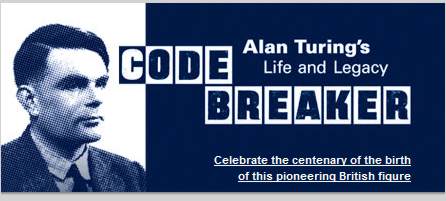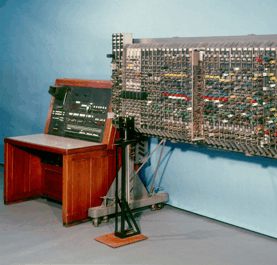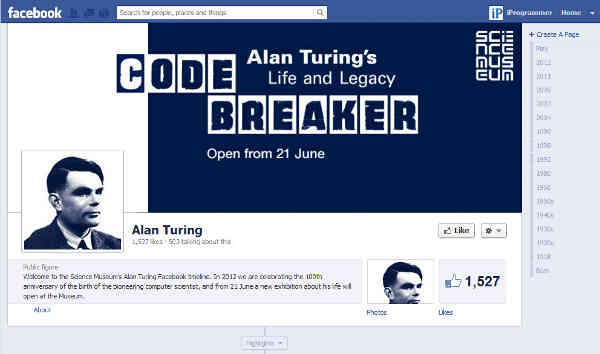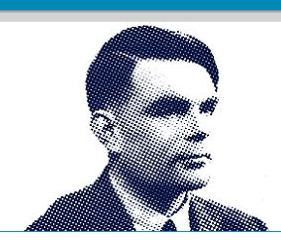Today is the 100th anniversary of Alan Turing's birth and to mark it the London Science Museum's special exhibition, "Codebreaker: Alan Turing's Life and Legacy" has opened. If you can't attend in person much of it can be experienced online, including in a Facebook Timeline.
Today is the 100th anniversary of Alan Turing's birth and to mark it the London Science Museum's special exhibition (sponsored by Google), Codebreaker: Alan Turing's Life and Legacy has opened. If you can't attend in person much of it can be experienced online, including in a Facebook Timeline.
?

?
In short video introducing the exhibition, curator David Rooney refers to the double meaning of? its title. While Alan Turing is perhaps best known in Britain as one of the World War II code breakers, the fact that he broke the, now obsolete, social code is a facet of his tragically short life that isn't ignored in this exhibition.
?
?
The Pilot ACE computer is one of the centrepieces of the exhibition, and is described as, "the most significant surviving Turing artefact in existence."
?

?
Given the focus of the exhibition on codebreaking, it is hardly surprising that an Enigma machine is included. In fact there are three such machines one of having been loaned by Rolling Stone Mick Jagger.
?

?
The story behind this is itself something of an enigma. Mick Jagger had a fascination with the Enigma machine since details of the codebreaking activities at Bletchley Park first came to public attention with the publication in the 1980's of book such at Gordon Wlechman's The Hut Six Story.
In 1993 he was outbid at an action, failing to buy a 4-rotor naval machine. The machine sold for ?24,172.50, and was included in a subsequent Guinness Book of Records as the most expensive piece of 'radio related equipment'. He did later manage to buy another machine which was used for authenticity in the film 'Enigma', which was the first released from Jagged Films.
This drive for authenticity is somewhat ironic as the plot of the film is true neither to history, nor to the book by Robert Harris on which it was based, in the way it ignores Alan Turing.
The exhibition is about Turing the man as well as about Turing the Father of Computing and the biographical aspects have been cleverly translated to a Facebook page that makes full use of the Timeline feature. It also makes a good repository for links and of course for comments from across the Internet.
It is however poignant to reflect that a man who at times in his life found it difficult to relate to other people should now have a growing circle of Facebook followers.

?
It is also very strange to see Facebook activity seeming to come from Alan Turing himself - but it does make you think of what he would make of it all if he had lived to see it.
?

?
Having had so little recognition during his lifetime Alan Turing is today being remembered and being acknowledged for his contributions to computing, computer science, computability, artificial intelligence and more.
?

Alan Mathison Turing
June 23, 1912 - June 8, 1954
More Information
Codebreaker: Alan Turing's Life and Legacy
AlanTuringCodebreaker on Facebook
Related Articles
Alan Turing's ACE
Alan Turing Year
Alan Turin born on this day
Alan Turing at Bletchley Park
Turing and His Times
Turing Centennial Celebration at Princeton
ACM Turing Centenary Event
?
blog comments powered by?
To be informed about new articles on I?Programmer, install the I Programmer Toolbar, subscribe to the RSS feed, follow us on, Twitter, Facebook, Google+ or Linkedin,? or sign up for our?weekly newsletter.
?

<ASIN:0140053050>
summer solstice michael jackson brave jerry sandusky kevin youkilis legend of korra ufc
No comments:
Post a Comment
Note: Only a member of this blog may post a comment.